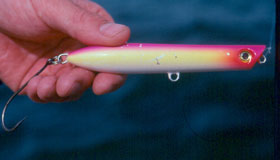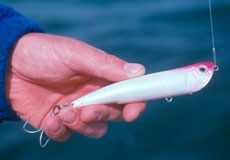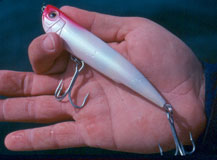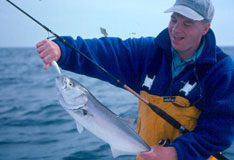Timing is everything. At least it was for Salt Water Sportsman Managing Editor Tom Richardson during a recent light-tackle bluefishing trip on the southern coast of Cape Cod. We were fast into them, too, catching six- to eight-pounders on surface plugs just about every time we located working birds. It was a classic blitz, with fish being released as fast as they were brought aboard. And that's when it happened.
As Tom was attempting to remove the hooks from yet another feisty blue, the fish suddenly squirmed, sinking the dangling treble deep into his hand. It was a situation that could have warranted a trip to the hospital, but fortunately for Tom (and the blue) we had mashed down the barbs on our hooks earlier that day, making them easier to remove from fish - and fingers!
After a little help from friend Kevin Tierney, Tom and the bluefish parted ways, the former suffering a few minor puncture wounds and some bruised feelings. However, a serious injury had been avoided.

If you intend to release your catch, replacing your plug's treble hooks with single hooks will reduce the amount |

Removing the bellyhook(s) on a plug will cause less injury to the fish and make releasing it easier. You can go one step further by crushing the barbs on the remaining treble hook to further facilitate its removal. |
Trouble with Trebles
Most hard-plastic or wooden lures come equipped with treble hooks, sometimes two or more. The reason? They catch more fish! They make sense if the fish are few and far between or if you plan on keeping your catch. However, when the fishing is hot and heavy, or if you plan to release your catch, treble hooks can actually be a disadvantage. Removing them from a fish's jaw or mouth often requires more time and effort, which increases the amount of time the fish is kept out of water and its stress level. Furthermore, treble hooks can inflict serious injuries to fish by snagging them in the head, eyes, gills or stomach. And, as in the incident described above, treble hooks can also pose a real risk to anglers.
Modifying your plugs by crushing the hook barbs or replacing the trebles with single hooks proves more angler- and fish-friendly. While you may occasionally miss a fish or two, the lure's overall effectiveness won't be compromised too much. In fact, such hook modifications may even help you catch more fish. For instance, mashing down the barb on any hook allows it to penetrate under less pressure, a big advantage when using light tackle.
During a blitz, a single hook allows you to unhook your fish quicker and get back in the action, ultimately increasing your catch. And when trolling for big fish, replacing the stock hooks with stronger single hooks could eliminate the chance of a straightened hook. Finally, removing all but the rear hook from a multi-hook plug allows the angler to control the fish at boatside by gripping the plug.
Below are several modifications that will make your lures safer, more release-friendly, and perhaps even increase their overall effectiveness. It's essential to remember to select hooks that are strong enough to support your style of fishing. If you plan on trolling for tuna and wahoo on 30-pound-class and heavier tackle, for example, make sure your replacement hooks won't straighten under the extreme pressure these fish exert on your tackle. Whenever possible, retain the split rings that connect the hooks to the plug, and upgrade them when using heavier tackle. If the hooks are fastened directly to the plug body, binding could occur. And that could ultimately cost you a fish or damage the plug. Finally, sharpen each hook to assure maximum penetration with the least amount of effort.

Crushing of the barbs on all your hooks makes them easier to remove. As an added bonus, they will also penetrate more easily. |
|
A modified topwater plug without the lead hook makes it easy to control and land small gamefish, such as this Bluefish. |
Crushed or Clipped Barbs
When the action is really hot and you don't have time to change hooks, take a pair of pliers and simply crush the barbs on each hook. This makes them easier to remove, and allows them to penetrate easier. On the other hand, it also makes it easier for a fish to throw the hook, so be sure to maintain a tight line throughout the fight.
If you prefer a barbed hook, then simply clip off two of the three points on each treble. The plug may not be aesthetically appealing to you, but the modified hook will get the job done. It will also be much easier to remove than the original set of barbed trebles.
Double Your Singles
Replacing treble hooks with single hooks has become a popular option, particularly among the offshore crowd. A long-shank hook delivers the coverage to catch fish by extending beyond the plug's body. Whether the barbs are crushed or left intact, the plug will pose less harm to a fish than the original trebles. The new hooks are also much easier to remove. As mentioned, make sure the replacement hooks can stand up to the strain exerted by your tackle and the game fish you intend to catch. The jaws of a big wahoo or tuna, for example, can actually bend or straighten a light-wire hook.
Singles Only
Whether you crush the barbs of a treble, clip off all but one point or switch over to a single hook, eliminating all but the rear hook makes a lot of sense. Not only will this make releasing the fish easier, you'll also eliminate the danger posed by a dangling second hook. And depending upon the size and species of fish, you can now grip the plug to lift the fish into the boat or release it at boatside.


